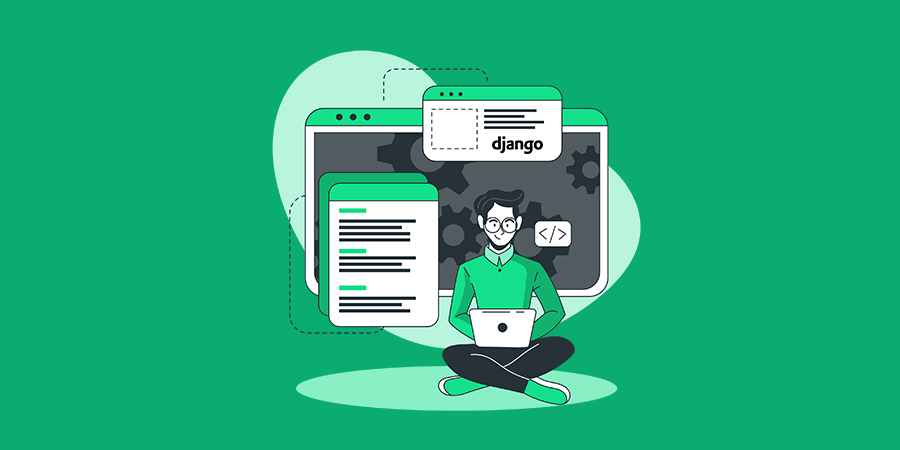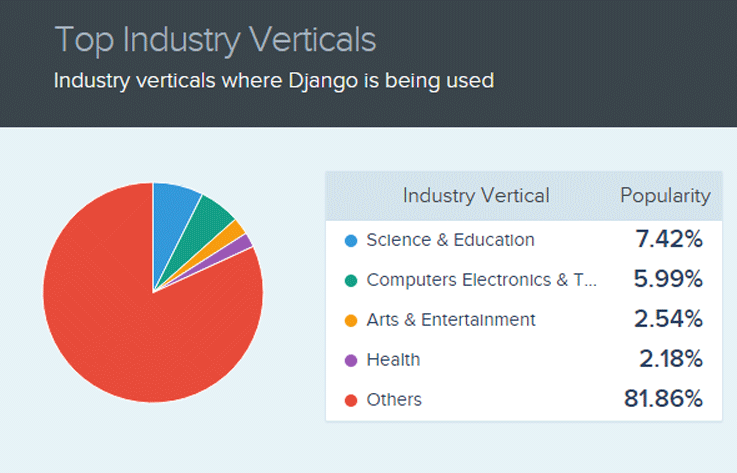
From Idea to Launch: How to Create an AI Dating App ...
Dating apps have changed how people meet and start relationships. Inst...

Choosing the right framework for web development is a challenging task. Many different frameworks exist, each tailored to a certain set of requirements. When deciding on a framework, every developer considers three factors: the language used, the tools available within the framework, and the reputation it has in the market. Since Django is the greatest of its kind, it easily surpasses all of the benchmarks. Django is an obvious option for a wide variety of businesses and organizations. Django is hailed as one of the most well-known frameworks for building websites.
Although Django has many Django alternatives to consider but still preferred by coders and business owners. It is because Django is an open-source and python-based web development framework that makes it easy to create functional, database-driven websites. It makes the life of a web developer easier by eliminating several headaches. Using it, you can create streamlined, intelligent online apps. Django provides developers with the flexibility to rapidly build custom web apps to meet ever-changing enterprise needs.
Since it’s created by experts in the field, you can put your full attention on the application’s design rather than worrying about the technical underpinnings of building a website. The question is, why is it the case? Why Django is over other web frameworks? To get the answer, Let’s talk about the main reasons why businesses are adopting this Django, and why you should consider it for your next project.
Django is a web application framework written in Python. Django is a web development framework that uses the Model-View-Controller (MVC) and Model-View-Transaction (MVT) architecture pattern. This framework’s speed, abundance of packages, security, scalability, and adaptability set it apart from its competitors. With this framework, you’ll have access to an advanced and ready-for-production Automatic administrative interface for controlling your website’s data. Django has been used in many industry verticals, let’s check out the image below.

The interface is model-centric and requires no human data entry thanks to the information that is read directly from the models. Django also has multilingual support, which can translate text between various languages. Dates, timings, numbers, and time zones are also formatted in a locale-specific way.
The primary objective of Django is to make the lives of programmers easier. The Django framework uses the following for this purpose:
Let’s go through some of the most important reasons why businesses use Django, and why you should, too, for an upcoming project.
Django is a framework written in Python, which is widely acknowledged for its accessibility. Due to its accessibility and popularity among beginners, many pick this language as their first foray into computer programming. This language is being used to teach students at colleges and universities how to code. Expert programmers and novices are utilizing this language for data science, machine learning, and other applications. Python is a reliable language, and Django retains many of Python’s finest features. Django’s core files and codes are written in Python, with no exceptions. If you already know Python, learning Django won’t be difficult either.
Python is lauded for its user-friendliness, clarity, and accessibility. Many first-time programmers have chosen this language because of its low barrier to entry. Colleges and institutions use this language to instruct students in computer programming. People of all skill levels in the fields of computer science, machine learning, and others utilize this language. Since Python is a relatively dependable language, Django naturally takes on many of its essential benefits. All documentation and code for Django’s main components, including all exceptions, are written in Python. If you know how to code in Python, picking up, Django won’t be a challenge.
One of Django’s major assets is the speed with which it can develop and deliver applications without compromising the system’s level of security. This framework includes a number of built-in safety features, all of which are set to active by default. The majority of the most common security flaws, such as cross-site scripting, request forgery, clickjacking, and SQL injection, are automatically prevented. Django reacts quickly to security issues by providing fresh solutions and alerting other frameworks about the issues.
Django is a cross-platform framework, meaning its code can be deployed and executed on any computer system. The framework’s capability to operate across numerous platforms makes it valuable for providing support for multiple environments throughout the development and production processes. Django utilizes a layer known as an object-relational mapper. This layer sits between the developer and the database (ORM). Because of this layer, you can easily move the project over to work with other common databases by making only a few modifications to the code.
To put it simply, Django is a free and open-source framework that makes it easier to create safe and practical sites. With Django, you can devote more time to the strategic and technical components of the development process since the framework already has the nuts and bolts covered. This will boost the development speed, allowing you to complete Django open-source projects in less time than is often required. Django has a large developer community behind it, and the code is constantly being updated by those that use it. The community also releases a steady stream of new libraries designed to help developers with the coding problems they encounter when working on a project.
Django has more amazing documentation than most of the other web frameworks. With a framework as powerful and feature-rich as Django, there is a lot of information to cover. The team behind Django does a great job of organizing their docs so you can easily find what you are looking for. They also have several how-to guides that walk you through building your first web application with Django, including tutorials on how to build a simple blogging platform and a social network. These getting started guides are extremely helpful if you’re new to web development or just want to learn more about Django.
By maintaining a clear separation between their business logic and user interface layers, small businesses can streamline and speed up the creation of sophisticated web applications with this framework’s support for the MVC pattern. However, Django’s implementation is slightly different. It frees up developers from having to choose between managing templates and controllers. Developers can focus on other aspects of the application without worrying about how the model and view are related. They need only adapt the corresponding model, view, and template to the given URL.
Django’s ORM is fully functional and compatible with many different back-ends. ORM, or Object Relational Mapping, is a system that facilitates the transfer of information between databases and objects. Multiple databases can be opened and worked on simultaneously. Simple queries are a strength of technologies like Eloquent, Yii AR, and others, but if the ORM cannot address the use case, you will need to build the queries yourself. Thankfully, that’s not the case with Django. It’s elegantly constructed, and it processes database queries with ease.
Since nearly everything needed to create a fully functional application is readily available, Django has gained widespread popularity. Some of the features that power these gadgets are objected relationship modeling, authentication, HTML templating, session management support, URL routing, middlewares, HTTP libraries, multi-site support, internationalization and localization, template engine, forms, view layers, model layers, Python compatibility, and so on. The frameworks provide a plethora of libraries and tools for typical applications. The availability of such extensive backing frees up developers to concentrate on core features rather than starting from scratch.
Most frameworks need you to build the control panel’s administrative interface from scratch, which is a laborious and time-consuming process. Each application you create with Django comes with its own fully-functional web interface. Developers may easily add, edit, and remove users and other database items with the app’s clean and well-organized admin panel. With the use of external programs and wrappers, you may change the look and feel of the admin panel and even add a dashboard to better suit your needs.
The authentication and permissions components are included by default as well. It doesn’t take weeks or even days to put together. Creating a user profile in most apps requires a variety of information, including a username, email, address, phone number, and so on. You won’t have to look elsewhere for most of the user profile features you’ll need because Django already has them. There are only so many frameworks or libraries that offer such extensive backing.
Many developers prefer Django, and some of the biggest names on the web even use it. Django’s speed, flexibility, and ease of use are appreciated by a number of well-known web applications, including the ones listed below.
Instagram is a well-known social network that processes massive amounts of user interactions and media content every day. Django facilitates the features that help the web program run smoothly, add new features, and resolve issues rapidly.
Massive media archive where users can stream songs for free or pay to remove ads. Technically, Spotify employs machine learning, for which Python is a strong candidate. It was built in tandem with the Django framework by its designers.
Cloud computing is ideal for storing large amounts of data, but it must have robust features. Dropbox is able to offer its services of sharing and syncing as well as scalability because to Django.
This widely-used web browser is another example of a web application that has made the transition from PHP to Python and, by extension, Django. It can now more easily accommodate high volumes of users and API requests.
Django is used for the most critical parts of the system’s functionality. Even while their website does not get as many visitors as Instagram, it can nevertheless handle high-resolution images and receives over 2 million monthly pageviews.
Over 250 million unique users access this site every month; it processes massive amounts of media data without sacrificing its straightforward design. Its open-source nature allowed the developers to tailor the framework to their own requirements.
Is there a website that everyone visits first for social media updates and debates? Most people’s go-to is Reddit, an online community where users can discuss anything and everything and where the best contributions are highlighted through a voting system. Many of Reddit’s features, such as handling high volumes of user traffic, are powered by Django.
The Django Python framework is the way to go when creating complex online applications. To successfully advertise and digitize your products, your business should take advantage of the many features offered by this Python framework. You can consult a professional Django web development company like Nascenture to add a powerful Django web app to your product. We can transform your company plans into high-performing, unique online solutions because of our extensive experience and knowledge. Anytime you need help with a Django product, you can contact us.